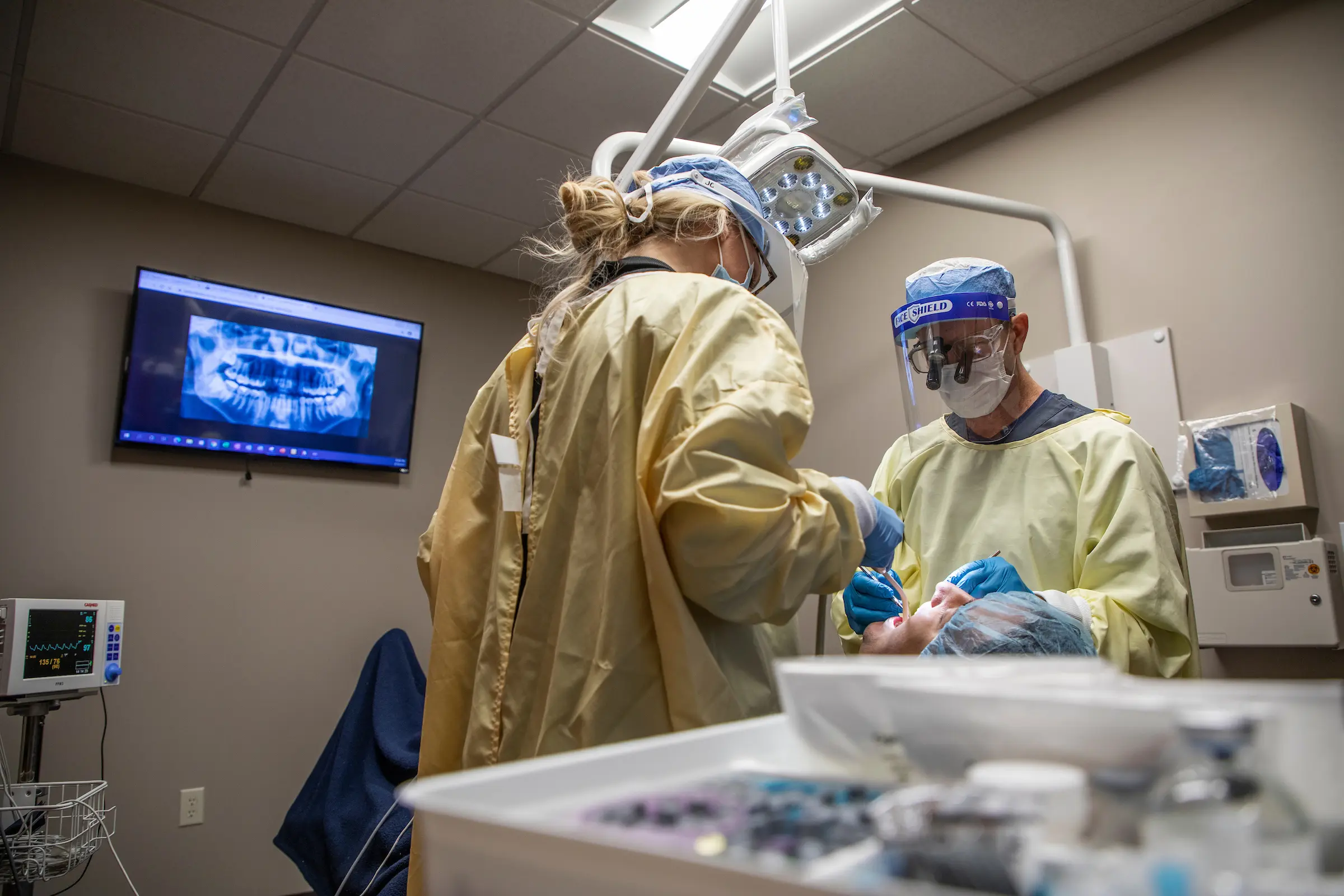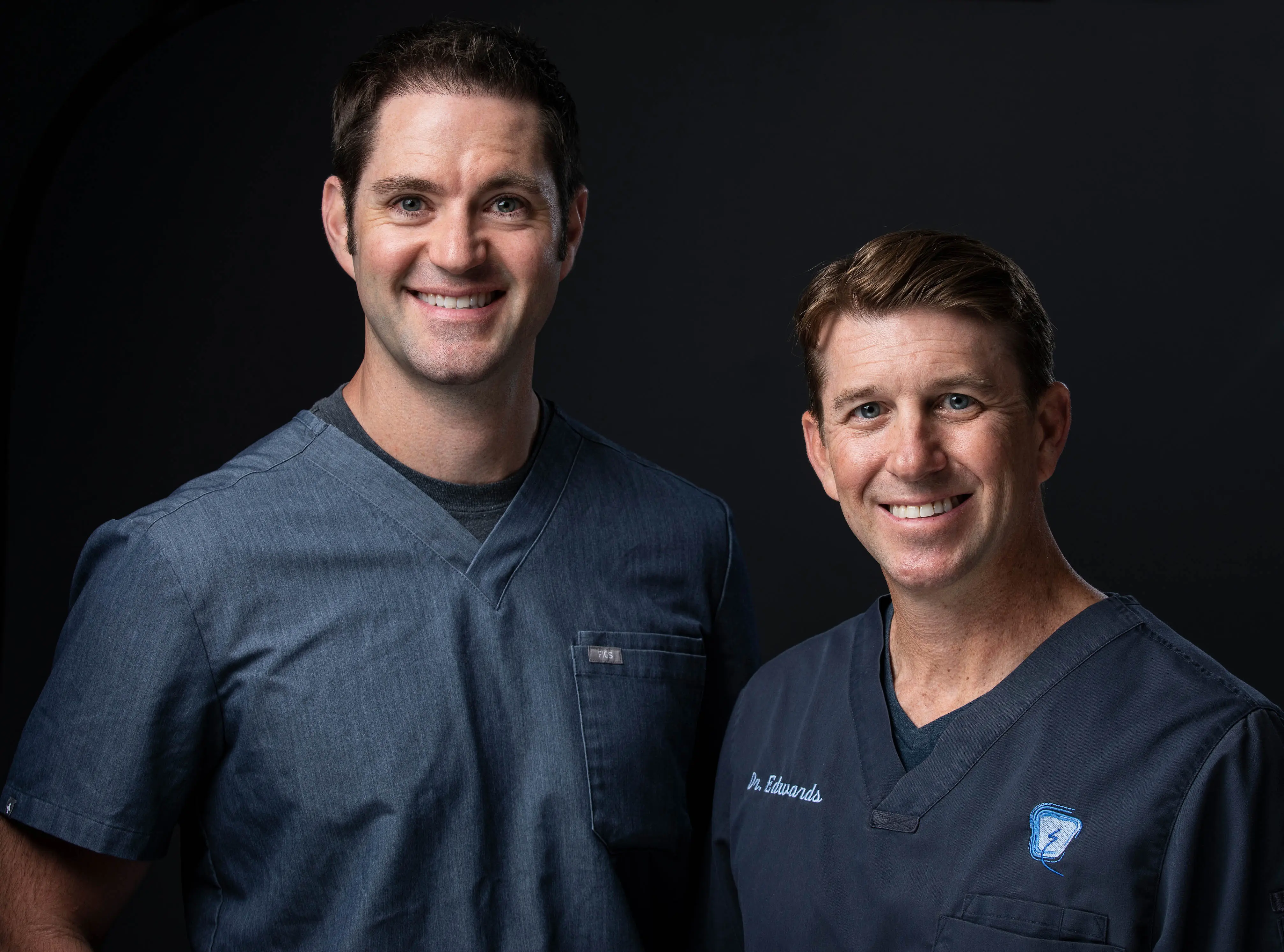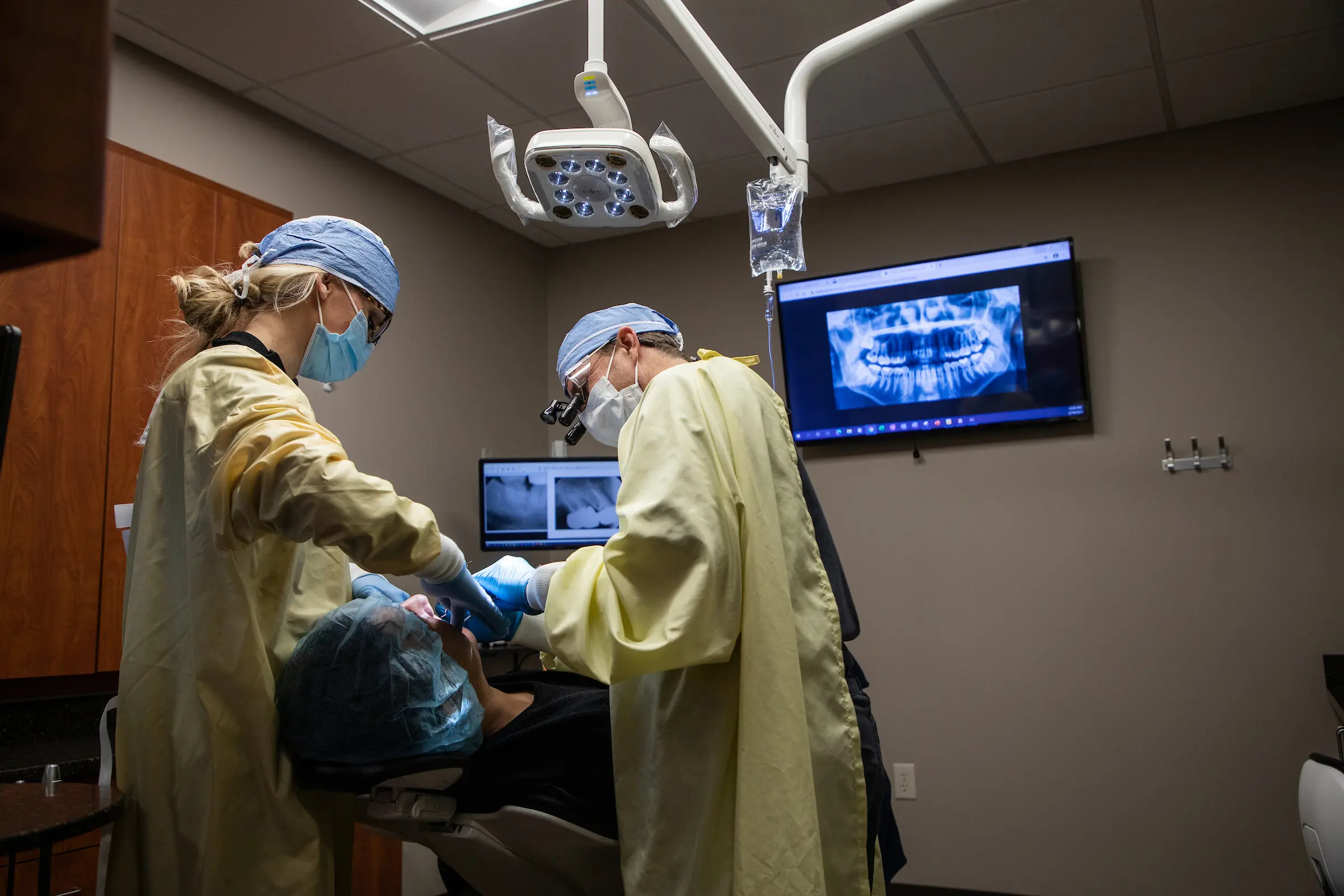Periodontal or gum disease can harm the bone and the surrounding tissues around your teeth. Gingivitis is the first stage of gum disease.
Periodontal or gum disease can harm the bone and the surrounding tissues around your teeth. Gingivitis is the first stage of gum disease. If treated at this earlier stage, gum disease can be prevented and even reversed. If not treated, it will lead to periodontitis, which will damage the gums, bones and other structures that support your teeth, causing tooth loss.
Implant Dentistry and Periodontics is there to assist you with all stages of gum disease. We offer a wide assortment of periodontal and dental implant services. Our careful and compassionate team focuses meticulously on a team goal of providing to you the absolute best for your overall oral health and a healthy smile. We will work with you in a calming, relaxed environment, and embrace your dental care as an important partner on your health care team. If you would like to have an evaluation about the potential of you having gum disease, call our Indianapolis office at 317-574-0600 or our Fishers office at 317-842-2273 to schedule your appointment today.
Gum disease has unfortunately become increasingly common. Over half of Americans 30 years and older, and over 70% of adults over the age of 65, currently have some form of gum disease. Gum disease is usually painless, and you will not feel it at the onset, but it will manifest itself into an infection, puffiness, sensitivity, or inflammation of your gums. If left untreated long enough, gum disease will begin to deteriorate your jawbone, and will result in loss of teeth or the necessity of extensive dental surgery. There are also significant health issues associated with gum disease, including a stroke, diabetes, and heart disease. Gum disease often called a silent disease. There are very subtle symptoms and signs of early-stage gum disease and you may never know you have a problem. This makes routine dental care with Implant Dentistry and Periodontics an important part of maintaining healthy teeth and gums, providing us with the opportunity to identify potential dental health concerns such as gum disease in the early stage and take the proper preventative measures.
The Stages of Gum Disease
One of the best ways to prevent the development of severe gum disease is to be educated about different stages of gum diseases and what symptoms are associated with each level.
- Gingivitis, the first stage, is the most common periodontal disease. Gingivitis develops when plaque can build up around the gums. Gingivitis will make itself evident primarily in your gums, which will become swollen, irritated, or puffy. If you ignore gingivitis it will quickly lead to periodontitis and other significant health issues. Gingivitis is relatively easy to address through a simple deep cleaning.
- Early Periodontitis, the second stage, occurs when the bacteria that has formed around the gum has progressed in severity, and now the symptoms are bleeding gums and the continued growth of plaque below the gum line, and now the mild or moderate loss of bone around the teeth. If you have reached this stage of gum disease, Implant Dentistry and Periodontics will now need to exercise a more advanced treatment. We might recommend laser therapy, deep cleaning, or a combination of both.
- Advanced Periodontitis, the final stage, occurs when the plaque, the toxins, and the bacteria have built up so much that they have now formed sagging pockets between the gums and teeth, which simply enhances the problem by allowing additional bacteria to settle. This in turn accelerates the advanced deterioration of the jawbone. If you have reached this stage of gum disease, laser therapy, deep cleaning, or a combination of both will be recommended.
Some Warning Signs of Gum Disease
Unfortunately, these signs and symptoms may not be easily recognizable by you until the disease has already reached a severe or advanced level. Professional evaluation is critical to early detection and treatment.
- Red, swollen, or tender gums
- Receding gums
- Gums that bleed easily, especially when you brush
- Gums that have pulled away from the teeth creating pockets
- Persistent bad breath or bad taste
- Teeth that are loose, shifting, separating, or changing position
- Any change in the way your teeth fit together when you bite
- Any change in the fit of dentures or partial dentures

At Implant Dentistry and Periodontics, we offer a wide range of periodontal and dental implant services. Our caring and compassionate team has one collective priority and that is your smile.
Contact Our Team Today
The Different Treatments for the Different Stages of Gum Disease
The staff at Implant Dentistry and Periodontics Gum can treat all stages of gum disease. We will provide the proper treatment which may include:
- Prophylaxis (teeth cleaning) – In the early stages, most cases of gum disease can be stymied and reversed using a simple cleaning procedure by one of our dental hygienists.
- Scaling and root planing – A more advanced method of a gum cleaning, a scale and root planing procedure involves deeply cleaning under your gums and then planing the surface of the root to remove the toxins and bacteria and stop the spread of the gum infection.
- Gum surgery – In even more advanced cases of gum disease, we may recommend gum surgery in conjunction with a regenerative procedure to eliminate the disease and help restore lost tissues.
- Bone grafting – In the most advanced cases of gum disease, bone density is lost around the teeth, which leads to eventual tooth loss. We may recommend a bone grafting procedure in addition to one of the gum treatments above to regenerate the level of bone and stabilize the oral health.
- Antibacterial rinses: when appropriate, we may prescribe an anti-bacterial rinse to be used at home and to reduce the level of bacteria present in your mouth.
The absolute most important thing you can do to prevent gum disease from developing is to continue practicing good oral hygiene habits at home. Maintaining these preventative habits is essential to avoiding gum disease from even developing. Be sure to brush twice daily and for at least two minutes each time you brush. Also maintain regular flossing habits and consider investing in antimicrobial mouth rinses.
Along with these important at home care practices, it is also important that you continue scheduling regular visits with Implant Dentistry and Periodontics. Visiting us twice a year will allow us to compliment your work by conducting deep cleanings and monitor the overall state of your oral health and being proactive on any issues.
Earning your Trust with High Quality Periodontal Care
When you visit our engaging staff at Implant Dentistry and Periodontics, you will be surrounded by a very professional and friendly team that has the most advanced dental technology at our disposal. Each one of us is conscientious and quite thoughtful because we realize how different and unique each patient really is. We map out specific personalized treatments that work within your desires and budget. Our goal for you is placing value back into your undervalued personal asset, your smile, so every dental service is performed with your best interests and oral health in mind.
At Implant Dentistry and Periodontics, we are quite reliable about maintaining a relaxed, comfortable, and restful clinic, and we want you to always be confident in our consistency in our abilities and our services. Scheduling an appointment for a potential gum disease procedure is an important step towards being proactive in your oral health and regaining your healthy smile. To schedule an appointment, call our Indianapolis office, 8801 North Meridian St., Ste 103, Indianapolis, at 317-574-0600 or our Fishers office, 9885 E. 116th St, Ste 300, Fishers, at 317-842-2273.



